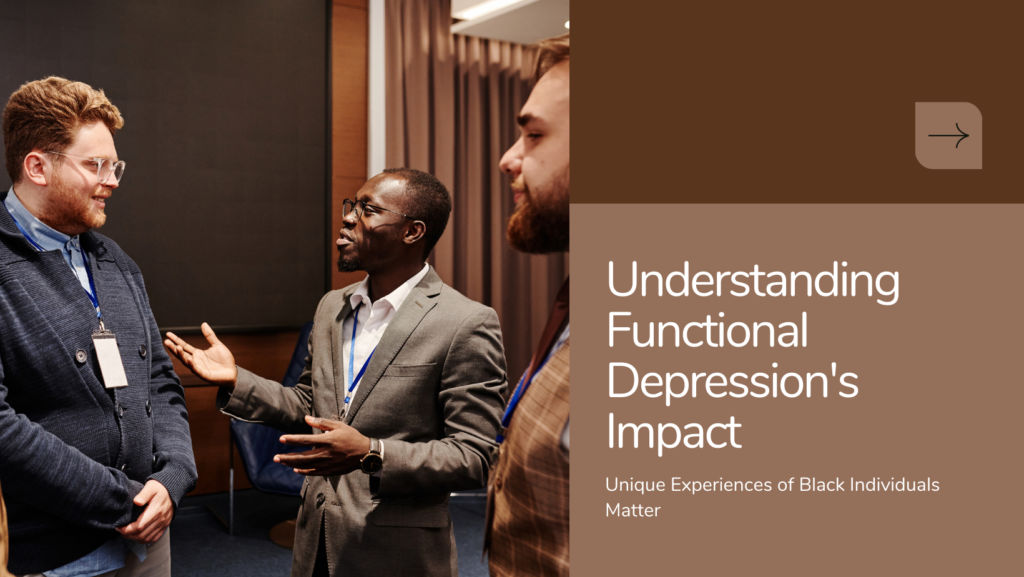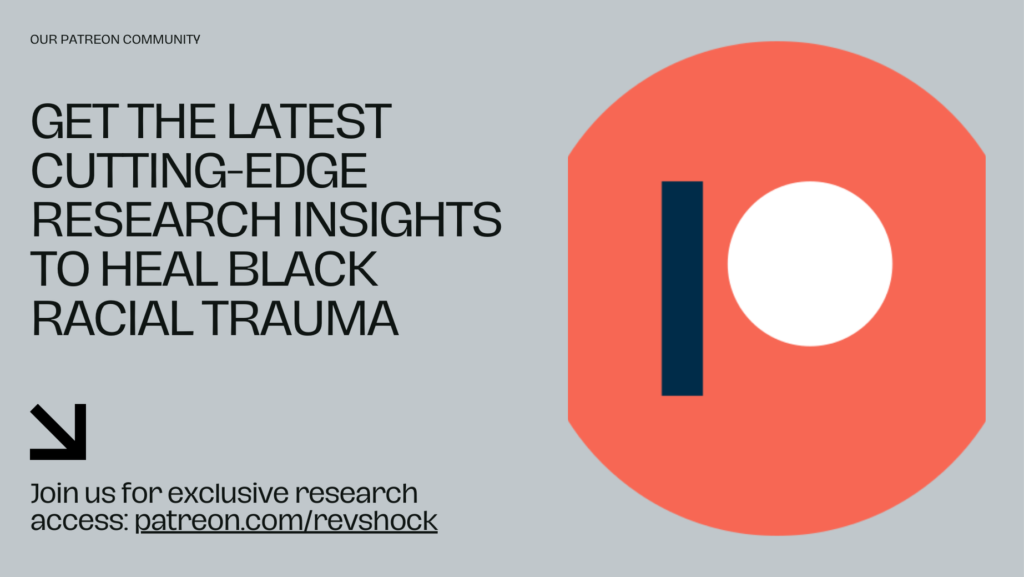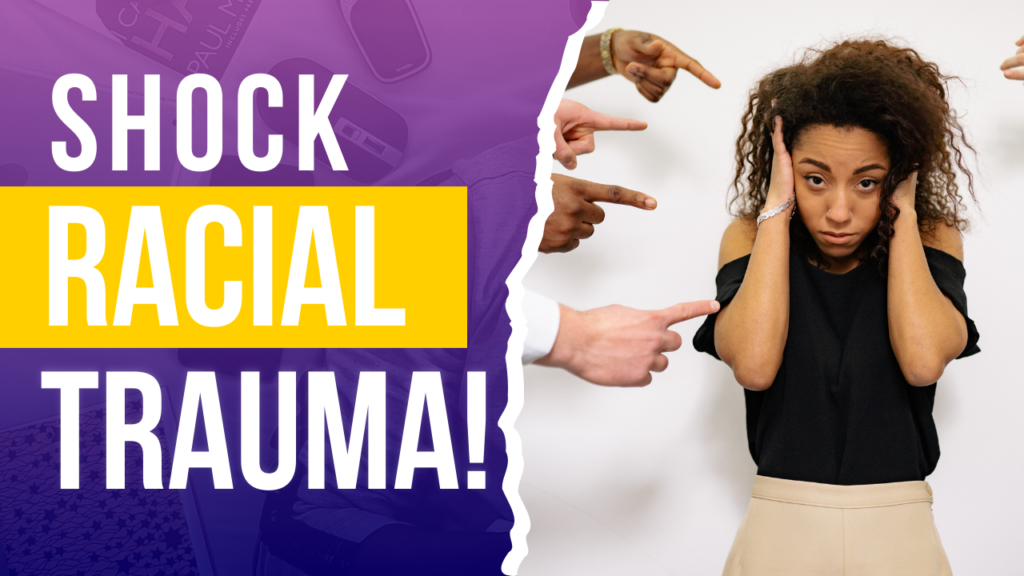
Researched and Curated By Rev. Dr. Philippe SHOCK Matthews
(Black Trauma and Mental Health Specialist | Prompt Eng | GPT Dev | Research Scientist | Africana Phenomenologist | Black AI Corsortim co-Founder)
Functional depression, also known as depression with functional impairment, refers to a state where individuals experience depressive symptoms that significantly impact their daily functioning and quality of life. This type of depression goes beyond just feeling sad or low; it interferes with a person’s ability to carry out normal activities, maintain relationships, and engage in work or social interactions (Cummings et al., 2003). Functional depression is particularly relevant when considering its impact on different racial and ethnic groups, such as Black people in America.
Research has shown that Black individuals, especially women, are disproportionately affected by depression compared to other ethnic groups (Settles et al., 2010). Factors such as perceived racism, discrimination, and social isolation contribute to the higher prevalence of depressive symptoms among Black Americans (Pieterse et al., 2012; Taylor et al., 2020). Additionally, experiences of stress related to racial identity, socioeconomic disparities, and lack of access to mental health care services further exacerbate the burden of depression within the Black community (King et al., 2022; Hankerson et al., 2015).
One significant aspect that uniquely affects Black people in America is the intersectionality of race and mental health. Studies have highlighted how racial discrimination and ethnic identity play a crucial role in shaping the mental health outcomes of Black individuals (Yeo et al., 2024). The experience of discrimination, both overt and systemic, has been linked to increased depressive symptoms among Black Americans, highlighting the need to address structural racism as a root cause of mental health disparities (Mereish et al., 2016; Haeny et al., 2021).
Moreover, the impact of historical trauma and intergenerational effects of oppression cannot be overlooked when examining the prevalence of depression among Black individuals. The legacy of slavery, segregation, and ongoing systemic inequalities contributes to the psychological distress experienced by many Black Americans (Elçi, 2020). These deep-rooted issues manifest in various forms, including feelings of hopelessness, helplessness, and a lack of control, all of which are common symptoms of depression.
Furthermore, the COVID-19 pandemic has exacerbated mental health challenges within the Black community, with studies indicating higher levels of stress, anxiety, and depression among Black individuals, particularly pregnant women (Gur et al., 2020; Avalos et al., 2022). The compounding effects of the pandemic, coupled with pre-existing social and economic disparities, have created a perfect storm for worsening mental health outcomes among Black Americans.
Religiosity and social support also play a complex role in how depression manifests within the Black community. While religious beliefs and practices can provide a source of strength and resilience, they can also contribute to underreporting of depressive symptoms due to cultural stigma (Robbins et al., 2022). Similarly, the availability and quality of social support networks can either buffer against or exacerbate the effects of depression among Black individuals (Elçi, 2020).
In conclusion, functional depression uniquely affects Black people in America due to a combination of societal, cultural, and historical factors. Addressing the mental health disparities within this community requires a comprehensive approach that considers the intersection of race, discrimination, socioeconomic status, access to care, and the broader social determinants of health. By acknowledging and addressing these complex issues, it is possible to work towards reducing the burden of depression and improving the overall well-being of Black individuals in the United States.

References:
Avalos, L., Nance, N., Zhu, Y., Croen, L., Young-Wolff, K., Zerbo, O., … & Badon, S. (2022). Contributions of covid-19 pandemic-related stressors to racial and ethnic disparities in mental health during pregnancy. Frontiers in Psychiatry, 13. https://doi.org/10.3389/fpsyt.2022.837659
Cummings, S., Neff, J., & Husaini, B. (2003). Functional impairment as a predictor of depressive symptomatology: the role of race, religiosity, and social support. Health & Social Work, 28(1), 23-32. https://doi.org/10.1093/hsw/28.1.23
Elçi, A. (2020). Cultural identity in beloved. Bingöl Üniversitesi Sosyal Bilimler Enstitüsü Dergisi, (21), 239-252. https://doi.org/10.29029/busbed.816663
Gur, R., White, L., Waller, R., Barzilay, R., Moore, T., Kornfield, S., … & Elovitz, M. (2020). The disproportionate burden of the covid-19 pandemic among pregnant black women. Psychiatry Research, 293, 113475. https://doi.org/10.1016/j.psychres.2020.113475
Haeny, A., Holmes, S., & Williams, M. (2021). Applying anti-racism to clinical care and research. Jama Psychiatry, 78(11), 1187. https://doi.org/10.1001/jamapsychiatry.2021.2329
Hankerson, S., Suite, D., & Bailey, R. (2015). Treatment disparities among african american men with depression: implications for clinical practice. Journal of Health Care for the Poor and Underserved, 26(1), 21-34. https://doi.org/10.1353/hpu.2015.0012
King, K., Key-Hagan, M., Desai, A., Mundy, T., Shittu, A., Roberts, L., … & Montgomery, S. (2022). Stress correlates related to depressive symptoms among young black men in southern california. American Journal of Men S Health, 16(3), 155798832210978. https://doi.org/10.1177/15579883221097801
Mereish, E., N’cho, H., Green, C., Jernigan, M., & Helms, J. (2016). Discrimination and depressive symptoms among black american men: moderated-mediation effects of ethnicity and self-esteem. Behavioral Medicine, 42(3), 190-196. https://doi.org/10.1080/08964289.2016.1150804
Pieterse, A., Todd, N., Neville, H., & Carter, R. (2012). Perceived racism and mental health among black american adults: a meta-analytic review.. Journal of Counseling Psychology, 59(1), 1-9. https://doi.org/10.1037/a0026208
Robbins, P., Carr, L., Conde, E., Vliet, R., & Darity, W. (2022). Shades of black: gendered denominational variation in depression symptoms among black christians.. Psychology of Religion and Spirituality, 14(4), 425-435. https://doi.org/10.1037/rel0000398
Settles, I., Navarrete, C., Pagano, S., Abdou, C., & Sidanius, J. (2010). Racial identity and depression among african american women.. Cultural Diversity and Ethnic Minority Psychology, 16(2), 248-255. https://doi.org/10.1037/a0016442
Taylor, R., Taylor, H., Nguyen, A., & Chatters, L. (2020). Social isolation from family and friends and mental health among african americans and black caribbeans.. American Journal of Orthopsychiatry, 90(4), 468-478. https://doi.org/10.1037/ort0000448
Yeo, A., Halpern, L., Flagg, A., & Lin, B. (2024). Discrimination and depressive symptoms among black and asian american college students: shared and group-specific processes of self-concept.. Cultural Diversity and Ethnic Minority Psychology, 30(1), 83-94. https://doi.org/10.1037/cdp0000549
Brought To You By…
- [IMMEDIATE DOWNLOAD] Know Your Rights eBook by the Law Office of Keith J. Staten https://bit.ly/4bD3MbK
- Enhancing Cognitive Performance: The Power of Neuromelanin Boosters https://t.ly/S-ePs
- FREE web series: Nothing is Wrong with Black People…Something Happened to Black People: https://bit.ly/3FJCsLo
- BlackTraumaGPT http://blacktraumagpt.com/
- MyGuardianDoc™ https://bit.ly/3TlgPaE – Your One-Stop for On-Demand Compassionate Medical Guidance, Urgent Care, Primary Care, and Virtual Second Opinions, all provided by licensed Medical Doctors.
Enjoying Our Content?
Become a member of our Patreon to get the latest research on Racial Black Trauma and learn the hidden science behind why 1st Frequency Black people are God’s/Amma’s greatest creation! https://www.patreon.com/revshock. Or buy Rev. SHOCK a Coffee! https://bit.ly/3yg5D7A


Book A Discovery Call
Are you ready to SHOCKtrauma? Click HERE now to book a discovery call with Rev. Dr. Philippe SHOCK Matthews

Get Social with Doc SHOCK:
PATREON: https://t.ly/mjksf | REV. DR. SHOCK (PERPLEXITY PAGE): https://t.ly/ppjwh | SOLO: https://solo.to/revshock | BIO: https://t.ly/Ko_y_ | BLOG: https://t.ly/j6bh0 | PODCAST: https://t.ly/cB5GD | ENDORSEMENT: https://t.ly/jFErO | THREADS: https://t.ly/SoKkT | IG: https://t.ly/XsN8f | FB: https://t.ly/R3r9Y | X: https://t.ly/iJ-wy | LINKEDIN: https://t.ly/GZ0pe | TIKTOK: https://t.ly/zfp60 | BLACK TRAUMA GPT: https://t.ly/vswbs | BLACK AI CONSORTIUM: https://t.ly/uiRZN | BOOKS BY PM: https://t.ly/vvHMd
